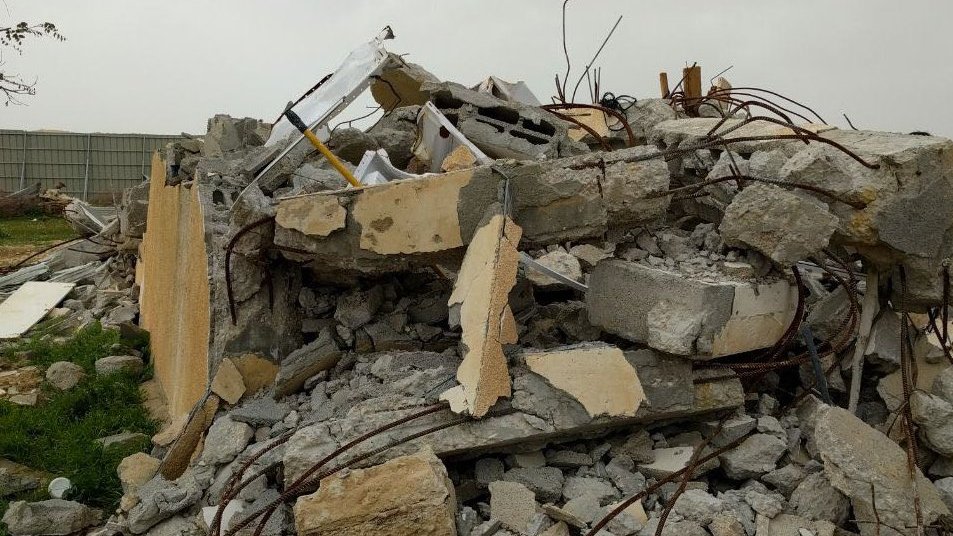Hundreds of building planners demand PM end Arab building discrimination
A group of Palestinian and Israeli city planners, graduates of joint School for Peace / Arab Center for Alternative Planning change agents courses, initiate a petition to the PM calling for a halt to house demolitions in Arab society and for alternative planning solutions that promote peace between the two peoples
Over 280 architects, engineers and building planners send an open letter to Prime Minister Netanyahu, objecting to ‘the ongoing discrimination against the Arab population in Israel in the area of housing and planning’; The letter claims that ‘natural growth on the one hand, and lack of planning on the other, have forced the Arab population to build without permits on a massive scale,’ and that demolishing these structures ‘violates morality and basic civil rights’; Among those who have already signed the letter are the dean of Bezalel’s Architecture department and professors from the universities of Ben-Gurion and Haifa.
Gahl Becker|Published: 26.03.17 , 14:45
“The Arab-Jewish Planning Forum,” which includes professionals from the fields of building and architecture, sent an open letter to Prime Minister Benjamin Netanyahu on Sunday. The letter opposes the building policies set forth by most Israeli governments since the country’s founding, which the forum sees as consistently discriminatory. So far, the letter has managed to collect the signatures of over 280 building planners.
Specifically, the “Building Planners’ Letter,” as it has been dubbed, describes a lack of issuing building permits for Arab communities, while simultaneously going ahead with the demolition of illegally built structures within those communities.
“We, Jewish and Arab planners, citizens of Israel, object to the ongoing discrimination against the Arab population in Israel in the area of housing and planning,” the letter opens. “After years of discriminatory planning policies, which reached new heights with recent demolitions in the town of Qalansawe and the village of Umm al-Hiran—we can no longer remain silent.”
The Building Planners’ Letter stresses that the lack of building permits—which would have allowed the Arab population to legally build more structures—brought on illegal building within those communities in an effort to meet the basic needs of this growing demographic.
“Natural growth on the one hand, and lack of planning on the other, has forced the Arab population to build without permits on a massive scale. The demolition of these homes, constructed out of distress in the absence of equitable planning, violates morality and basic civil rights.
“House demolitions are not the answer to building without permits. We demand an immediate end to the policy of house demolitions and call upon the authorities to advance worthy and fair planning policies—together with local communities—through which housing construction will be regulated and the needs of the population will be met.”
The letter ends by saying that “as planners and human beings, we aim to create hope. We are convinced that planning solutions are within reach and believe that equitable planning is the basis for a just, democratic society that serves the public good.”
The Arab-Jewish Planning Forum was founded several weeks ago and is comprised of planners, architects and engineers who wish to combine their professional work with creating social change.
Among those who have already signed the letter are: Architect Yuval Yaski, the dean of Bezalel Academy of Arts and Design’s Architecture department; Prof. Oren Yiftachel, from Ben-Gurion University; Prof. Rassem Khamaisi, from Haifa University; Architect Ayala Ronel; and Architect Amnon Bar Or.
Ofir Fichman, an architect who is a member of the Arab-Jewish Planning Forum, admitted that “there’s a lot of illegal building going on, but it’s due to real distress derived from the growth of the Arab population without there being specific master plans.”
He emphasized that “this isn’t an accusation against the current government. We’re talking about the discriminatory policies of most of Israel’s governments, which didn’t invest funds to promote detailed building plans for Arab communities.”
And are you now calling for more funds to be invested or also offering master plans and solutions?
“We’re a young forum, so we haven’t put together building plans, but our first call to action is a call to stop the demolitions within Israeli territories, which do not allow for a real solution. Demolishing a house and leaving people out in the rain does not offer a solution. The real solution here is to promote detailed master plans for Arab municipalities.”
Despite not yet having a course of action, what do you as professionals say about what’s going on in the field of building and planning in Israel?
“There is discrimination in the field of building within the State of Israel; the government doesn’t promote building within Arab society,” answered Fichman, adding that the forum also believes in “working together with local municipalities.”
For the time being, the forum has yet to formulate a position on the resistance coming from members of the Arab community to building initiatives that have come from municipalities and government.
One such plan has been offered by the Jerusalem Municipality, which aims to regulate Arab building by retroactively issuing permits for certain buildings while demolishing others, in favor of building new structures that will meet the official building standards and requirements.
“We haven’t taken it upon ourselves to represent the Arab population as a whole,” noted Fichman. “We are representing ourselves, as planners who oppose widespread structure demolitions.”

